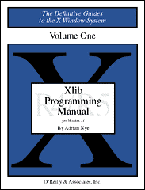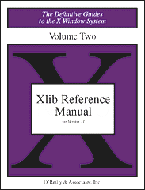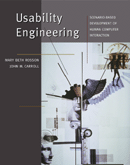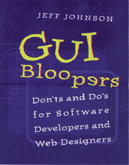Spring 2002
MWF, 1:05pm - 1:55pm, Fisher Hall 232


 |
The Definitive Guides to the X window system
Volume 1: Xlib programming manual by Adrian Nye 3rd edition, June 1992.
This is the complete programming guide to the X library (Xlib), the lowest level of programming interface to X. It is not a textbook per se, but covers X concepts. |
 |
The Definitive Guides to the X window system
Volume 2: Xlib reference manual by Adrian Nye 3rd edition, July 1992.
This is the complete reference guide to the X library (Xlib), the lowest level of programming interface to X. |
 |
Usability Engineering: Scenario-Based Development of Human-Computer
Interaction
by Mary Beth Rosson and John Carroll October 2001.
This book has been ordered quite recently. It may not be available for purchase immediately. |
 |
GUI Bloopers Don'ts and Do's for Software Developers and Web Designers
(
another site for this book
)
by Jeff Johnson March 2000.
|
You might want to wait for a few classes before purchasing all the books.
| Group project | 20% |
| Assignments | 30% |
| Midterm exam | 25% |
| Final exam | 25% |
The final grade will be calculated using a sliding scale using the percentages above.
If copying, plagiarism, cheating, or unauthorized collaboration is suspected, the case will be turned to the Dean of Students' office with supporting evidence. After this, the decision is made by the dean. The procedure is explained in the MTU Academic Integrity Policy (this is required reading!). We also have a departmental policy of reporting the suspected cases to the Department Chair's office.
You are expected to use common sense and the general outlines in the Academic Integrity Policy to make decisions. Some points specific to this course are:
If you need help:
Come to see me during my office hours, send your question over e-mail, or send me an e-mail message to set up an appointment. Do not hesitate to ask questions about the basics too. Try to do this early though. While I make every effort to answer last-minute questions, I might not be able to check my messages in the evening or over the weekend.
Please do not hold back your questions because "Dr. Onder is busy." Being busy is simply a fact of life, and will not change if you ask questions. I will be happy whenever I can contribute to your learning.
You may ask your friends in the class for clarification, and work over the material I supply together. You are not allowed to look at their answers or programs.
If someone comes for help:
You may answer clarification questions and general questions about the concepts. You are not allowed to show them your work.
If you use any other textbook or anything from the web:
You may use it by clearly acknowledging the source and its contribution to your work. For instance, "I found a program at http://www.xxx.yyy and built my program on top of it."
You will need to meet once or twice a week, outside the class hours with your group members. It is you responsibility to team up with students with whom you have compatible schedules, meet regularly, and involve every group member in the project. You can come to me if group members fail to perform their duties, but I prefer that you try to resolve this on your own.
The group or selected member(s) will present the design toward the end of the semester week.
The work done should be original and should not involve any unmentioned sources (please see the "unauthorized collaboration" section above).
The project grading break-up is as follows:
| Proposal | 10% |
| User/task analysis document | 20% |
| Initial design document | 20% |
| Peer evaluation | 5% |
| Presentation | 15% |
| Final report | 30% |
You will be assigned programming homeworks. While discussion with others is permitted and encouraged, the final work should be done individually. The programs, comments, and answers must be the original work of the author. You are allowed to build on material supplied in the class. I will be asking for the complete list of references you have used in the assignment. If copying or plagiarism is suspected, the case will be turned to the Dean's office with supporting evidence (please see the "unauthorized collaboration" section above).
All the assigments should be handed-in at or before the beginning of class on the due date. Late submissions are not accepted unless you notify me in advance with a reasonable excuse. Even so, late submissions may lose points in order to maintain fairness of grading.
I expect legible program source and documents---free of wrapped lines and neatly organized.
There will be no make-up exams. In the case of very unusual circumstances (e.g., death in the family, severe illness with doctor's written note), please come to see me and we can work something out.
As with the assignments, it is your responsibility to return legible answers. Unfortunately, I do not have the resources to decipher bad handwriting and might have to assume that no answer was given.
Collaboration or dishonesty during the exams is not acceptable and will be reported to the Dean of Students' office (please see the "unauthorized collaboration" section above).
I assume that you can program well BOTH in JAVA and C. In this course, we mostly work with large programs that use libraries. Initially, the number of new lines you write will not be much, but you will need to start with program templates.
Familiarity with both C and Java is essential.
If you think you have gaps in your background, please come and see me.
